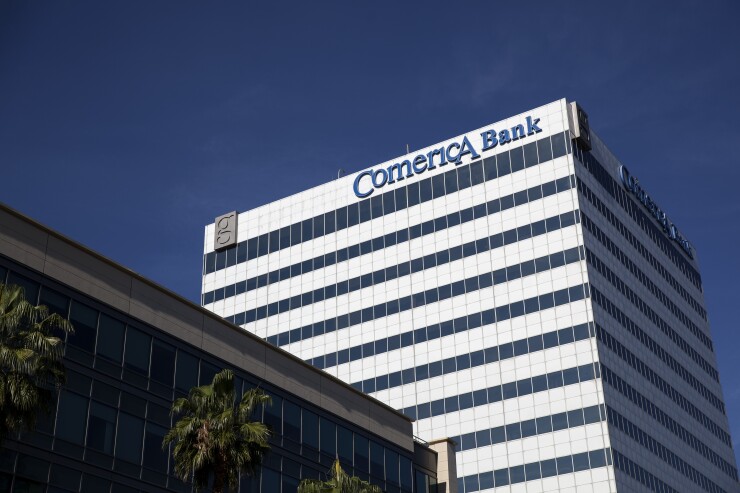The Consumer Financial Protection Bureau's lawsuit against Comerica Bank for allegedly mistreating recipients of federal benefits is the latest in a list of recent legal and regulatory entanglements for the Dallas-based company.
Processing Content
The suit, which accuses the bank of egregious customer service involving its operation of the Treasury Department's Direct Express program, comes just over three weeks after the company preemptively sued the CFPB in connection with its investigation.
It also follows a recent enforcement action by the Office of the Comptroller of the Currency related to the company's trust business. Comerica was found to have unsafe and unsound risk governance and internal controls practices.
The CFPB's lawsuit includes the allegation that Comerica's vendors "intentionally terminated almost 25 million customer-service calls from cardholders who were on hold before the cardholders could speak to a representative."
Scott Siefers, an analyst at Piper Sandler who covers Comerica, called the suit "a bad headline." However, the fallout might be limited given that Comerica's headaches with Direct Express have been "reported extensively in the media and therefore probably won't shock investors," Siefers wrote in a research note.
He also suggested that the impending arrival of the Trump administration could be helpful in shielding Comerica from damage that the consumer agency's lawsuit might otherwise inflict. "For all we know, the whole lawsuit could become moot under new CFPB leadership," Siefers wrote.
Comerica's troubles with Direct Express — which provides federal benefits on prepaid cards to 4.5 million Americans, including those who receive Social Security — have been brewing for some time. Last year, reporting by American Banker showed Comerica faced allegations that it violated contractual obligations by outsourcing fraud complaints from Direct Express cardholders to a vendor in Pakistan, and also by sharing sensitive customer data with vendors.
Amid the bank's ongoing challenges, Comerica last year hired a new chief risk officer, Brian Goldman, who previously worked at Citigroup and Goldman Sachs. And earlier this year, the $73.1 billion-asset company hired Floyd Kessler, previously of Silicon Valley Bank and USAA, into the new role of chief business risk and controls officer.
The CPFB's lawsuit, filed in the United States District Court for the Northern District of Texas, accuses Comerica of charging illegal ATM fees to customers and mishandling fraud complaints, in addition to deliberately disconnecting customer-service calls. The suit calls for the bank to end its allegedly abusive practices, provide refunds and pay fines.
In response, a Comerica spokesman said Friday: "We will continue to vigorously defend our record as the financial agent for the Direct Express program and remain committed to serving our cardholders."
Comerica's handling of the Direct Express program previously led to a class-action lawsuit that accused the bank of denying refunds to cardholders who claimed their benefits were stolen. In June, Comerica agreed to pay $1.2 million to resolve the case, which accused the bank of improperly overseeing third-party vendors of the Direct Express program.
Last month, Comerica went on offense against the CFPB, filing a lawsuit that accused the bureau of pursuing an overly aggressive investigation of its management of Direct Express.
Comerica's contract with Treasury to operate the Direct Express program will expire on Jan. 2. The Bank of New York Mellon will take over the lucrative contract the following day.
During Comerica's third-quarter earnings call in October, Chief Financial Officer James Herzog told analysts that the transition away from the Direct Express program "may be longer rather than short," considering its "complexity and critical nature."
He also said the bank is focused on making up for the loss of $3 billion of deposits tied to the program by prioritizing a core-relationship model, which would bring in more consistent funding.
As part of the separate OCC enforcement action in May, Comerica agreed to establish a board compliance committee, and to establish plans to enhance financial data collection and regulatory reporting, with independent reviews to ensure accuracy and compliance. The company was also ordered to develop an effective program for managing third-party risks.
Comerica's stock price closed Friday at $69.38 per share, down 0.77% on the day. So far this year, the company's share price is up 24.3%, compared with a 41.2% gain for the KBW Bank Index.







